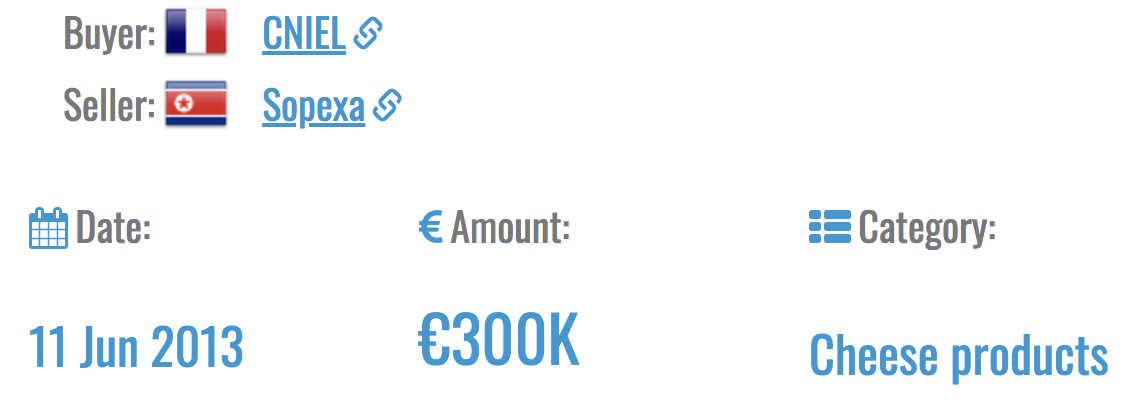North Korean cheese for France and the 20 quintillion € deal
Official EU public procurement database ridden with errors
The French organisation representing the national dairy sector ordering 300.000 € worth of cheese with a company based in North Korea. It may sound very unlikely, but this is exactly what an extract from the official European database on public procurement contains. A check of the database shows many errors, making the database basically unusable for higher level analysis, like comparing the public procurement behaviour of different countries.
According to data from the Tenders Electronic Daily, the daily updated database of public procurement published by the European Union, the Centre National Interprofessionel de l'Economie Laitière (CENIEL, the umbrella organisation for the dairy sector in France) signed a contract for a load of 'cheese products' with a total value of 300.000 € with a company based in North Korea.

On closer inspection of the contract award notice on the TED website, Sopexa, the company being awarded, turns out to have an address in the Gagnam area in Seoul. So in reality CNIEL ordered the cheese products from a company based in South Korea. Still peculiar that a French dairy organisation would order cheese from a South Korean company. But it is a lot more credible than ordering cheese from North Korea.
An even closer inspection reveals that the South Korean company Sopexa is an 'International Marketing & Communication Agency', according to the heading on its website. CNIEL can also be found in the list of Sopexa clients, next to organisations representing wines from Alsace, Bordeaux, Languedoc and Roussillon.

So it seems more likely that CNIEL paid 300.000 € to promote French cheese in South Korea than to produce and deliver the cheese itself. So the description 'Cheese products' is likely to be an error too.
The Sopexa contract is not a standalone case in the TED database, as a quick scan for companies registered in countries that usually don't do business with European countries reveal. Here are some more curious deals.
Apart from the Sopexa cheese deal, 4 more contracts were supposedly signed with companies from North Korea:
One company registered in Cuba was awarded a contract to deliver animal feedstuffs to the zoo of Pilzen, Czechia.
A Sudanese company was awarded a contract to deliver public road transport services in Finland.
A company from Zimbabwe was awarded a contract to supply materials for blood radiography to a hospital in Poland.
The 20 quintillion € deal
And it is not only the country of awarded companies that contain errors. Crucial data, like the total and final prices of contracts, turn out to also contain errors.
The contract with the highest agreed price in the TED database is a contract to deliver 'services' to the Communauté du commune du Pays fouesnantais, a group of municipalities in Bretagne, France. According to the TED database, the contract was worth almost 20 quintillion € (this is 20 x 10^18, or a 2 followed by 19 zeroes).
Unfortunately, we can't check the original contract award notice on the TED website anymore, as it keeps only copies of award notices for the last 5 years and this monster contracts dates back to 2006. But is certainly isn't the only error concerning the amounts in the database. 1039 contracts have a value of more then 1 billion €. And although it is technically possible to have contracts with governments and public institutions worth that much money, most of them seem to be errors.
Contracts above 1 billion €
The contract with the highest amount we can still consult the original contract award notice on the TED website for, points at what might be going on with these contracts. A contract to provide teaching supplies to the French Ville d'Ivry-sur-Seine has a value of 99 999 999 999 999 999 999 € specified under the heading 'Total final value of the contract'. On the other hand, the amount under 'Initial total estimated value of the contract' is only 47 840 €. So it seems someone made an error entering the information for the final value of the contract.
Checks
Because the TED database clearly contains errors, it is not possible to draw reliable conclusions from analyses of the raw data. At this moment, for example, it is not possible to compare the public procurement behaviour between countries: the enormous amounts in a small group of contracts would distort the analysis results completely.
So in order to perform any meaningful analysis of the data, the database needs to be cleaned up. Now it is up to the user of the TED database to do so. But ideally the burden of responsibility to provide correct data is put on the TED and its data suppliers, the national institutions responsible for public procurements. They have already put a lot of investment in the automation of the processing and publishing the public tender data and with modern data management techniques, flagging and correcting contracts containing probable errors (like North Korean company addresses, or amounts of 20 quintillion €) shouldn't be too complicated. It would augment the trust in the TED data, would make the work of the TED data users a lot easier and would make it possible to perform higher level analysis like country comparisons.
Share This Story:
- Log in to post comments

